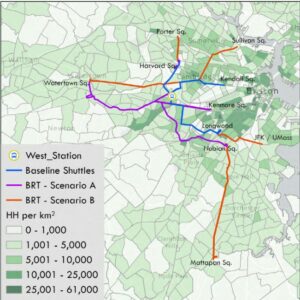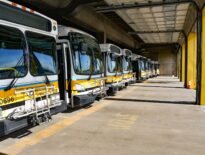
A conceptual bus rapid transit network suggested in the Metropolitan Area Planning Council's latest report on future Allston-area transit. Image courtesy of MAPC
Boston’s next major transit hub should offer frequent commuter rail service to prevent the Allston neighborhood from being overwhelmed with traffic congestion, Metropolitan Area Planning Council said in a new report on the $2 billion Allston Multimodal project.
Construction of the new West Station and the realignment of the Massachusetts Turnpike will make the former Beacon Yards rail yard available for redevelopment. Approximately 11 million square feet of development could take place in the neighborhood over the next 30 years, the report estimates, including 4 million square feet of air rights projects above the new station and turnpike.
The report, funded by a Barr Foundation grant, said the opportunity to create a new neighborhood should place transit at the forefront of planners’ decision-making.
“Time and time again, stakeholders recited a common refrain about what they didn’t want: ‘not another Seaport,’” the report states, noting that vehicles account for two-thirds of trips to the South Boston waterfront.
The estimated development pipeline could generate an additional 30,000 trips to the neighborhood after 2040.
MAPC’s West Station area transit study spotlights the need for frequent commuter rail service to encourage the use of transit. A draft environmental impact report submitted in 2017 by the Massachusetts Department of Transportation called for only four inbound and two outbound trips between 6 and 9 a.m., but Boston Mayor Michelle Wu has requested that trains run every 15 minutes at peak hours.
The report also envisions a bus rapid transit network using dedicated lanes and providing service every nine minutes to Harvard and Kendall Squares, Watertown Square, the Longwood Medical Area and Nubian Square. An expanded BRT network would add connections to Mattapan, Dorchester, Charlestown and Porter Square.
Along with the transit recommendations, policies such as variable tolling and surcharges on ride-share services could discourage vehicle trips.
The city of Boston and MassDOT is seeking a $1.2 billion federal infrastructure grant to offset the cost of the multimodal project. MassDOT last fall chose an at-grade option for replacement of the turnpike’s Allston viaduct in the narrow stretch between Boston University and the Charles River. MassDOT estimates construction could start in late 2023 and last for eight years.




 |
| 



